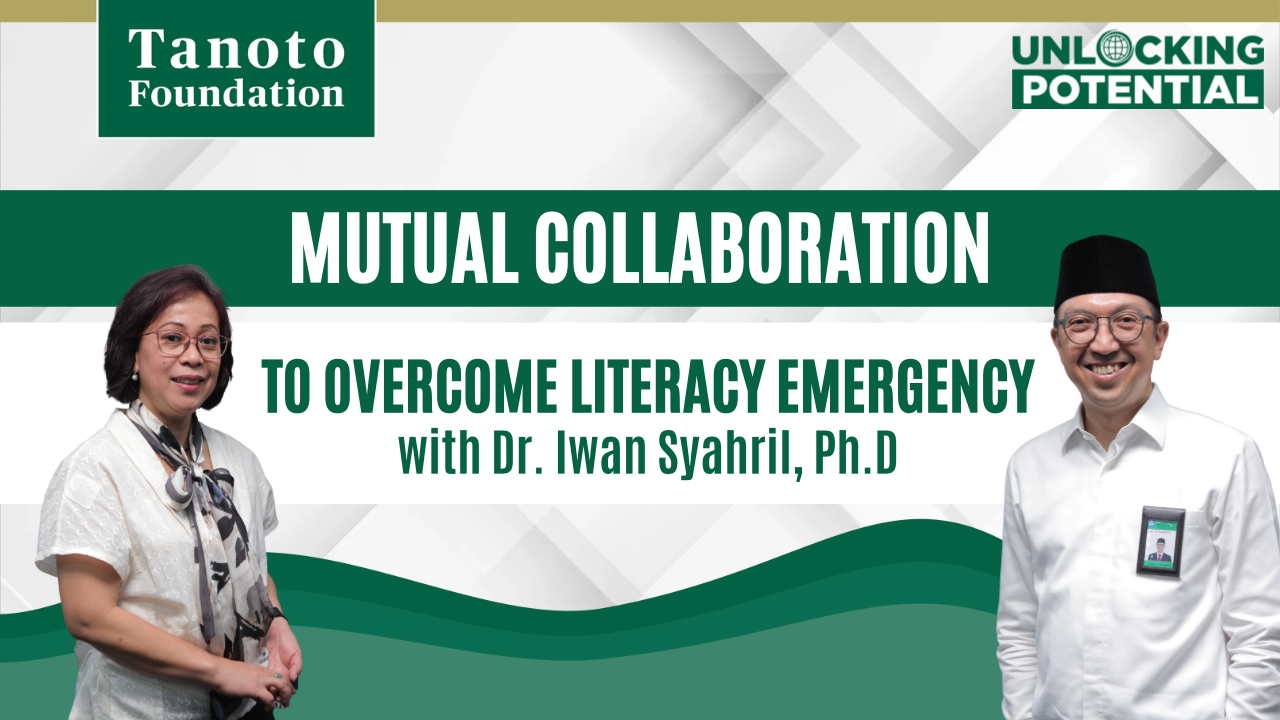Mutual Collaboration to Overcome Literacy Emergency with Dr. Iwan Syahril, Ph.D.

In the Unlocking Potential Podcast conversation with Dr. Iwan Syahril, Ph.D., Director-General of Early Childhood, Primary, and Secondary Education at the Ministry of Education, Culture, Research, and Technology, he raised the fact that Indonesia lagged behind other countries in literacy.
The former teacher explained the ministry’s policies and measures to boost the literacy level vis-a-vis the challenges the ministry is facing in carrying out its mission.
The findings of the Program for International Student Assessment (PISA) 2019 show that children’s literacy condition in Indonesia is worrying, because Indonesia is in the 62th position, out of 70 surveyed countries. About 70 percent of Indonesian students are below the minimum standard in literacy.
PISA is a global study by the Organization for Economic Cooperation and Development (OECD). It aims to evaluate educational systems by measuring 15-year-old school students’ academic performance in three subjects: mathematics, science, and reading.
According to the PISA report, in Indonesia, only 30 percent of students attained at least Level 2 proficiency in reading (OECD average: 77 percent). Some 28 percent of students attained Level 2 or higher in mathematics (OECD average: 76 percent).Some 40 percent of students in Indonesia attained Level 2 or higher in science (OECD average: 78 percent).
When Nadiem Makarim joined the Cabinet as Education, Culture, Research, and Technology Minister in 2019, literacy issues became the top priority of his Merdeka Belajar (Independent Learning) program.
The Program aims to boost Indonesia’s education quality through various ways, including curriculum improvement, the quality upgrade of pupils and teachers, as well as education assistance. The program is also related to the efforts in lifting literacy, which should be developed through various lesson subjects.
The findings of the National Assessment become an important indicator of the literacy situation and learning achievement in Indonesia. The outcome of the National Assessment was presented through the Education Report Platform.
The purpose of the Education Report Platform is to assist education units and regional governments in identifying school education challenges and as a foundation to design improvements based on integrated data. The close collaboration between the National Assessment and Education Report is expected to make education improvement efforts more effective and integrated.
The attempts to upgrade the Literacy Capacity of Indonesian children is a challenge that needs the participation of all related parties, from the government to the nucleus family.
The findings of the National Assessment becomes the government’s foundation to conduct various interventions in building literacy level as a part of the Golden Indonesia Vision 2045.
The interventions include a number of activities, such as the provision of books to regions that have low literacy levels, counseling or tutoring by students from Kampus Mengajar (Teaching Campus Program), and training for teachers, librarians, and school principals.
All activities are conducted in order to maximise impact while facing the challenges in boosting literacy capacity squarely.
The vast territory and complex governance are among the challenges faced by the government in improving literacy in Indonesia.
There are more than 500 regional governments that have their education budget and management, which makes it difficult to coordinate and supervise.
To overcome the difficulties, the government has established the Regional Literacy Partner Team (TPLD), whose main duty is to help local governments in stepping up literacy, including the establishment of comprehensive library and Internet access expansion.
Apart from the government, the family also plays an important role in developing the literacy capacity of the children. Iwan Syahril, who is also a former teacher, emphasized the important role of the family in providing books that are not just interesting for children but are also relevant and encouraging children to read.
“Sometimes we just provided books which the children like, not the books which parents want their children to read and understand.” This practice is to grow literacy habits, which is not just to read but also to trigger curiosity and critical thinking of the students.Literacy is not just about reading and writing but also about the formation of life-long curiosity and critical thinking.
Iwan Syahril called all of us to contribute” in creating a better literacy, especially for the next generation, the children. The Golden Indonesia Vision 2045 becomes our joint calling, which motivates us to move forward.”

Leave a Reply